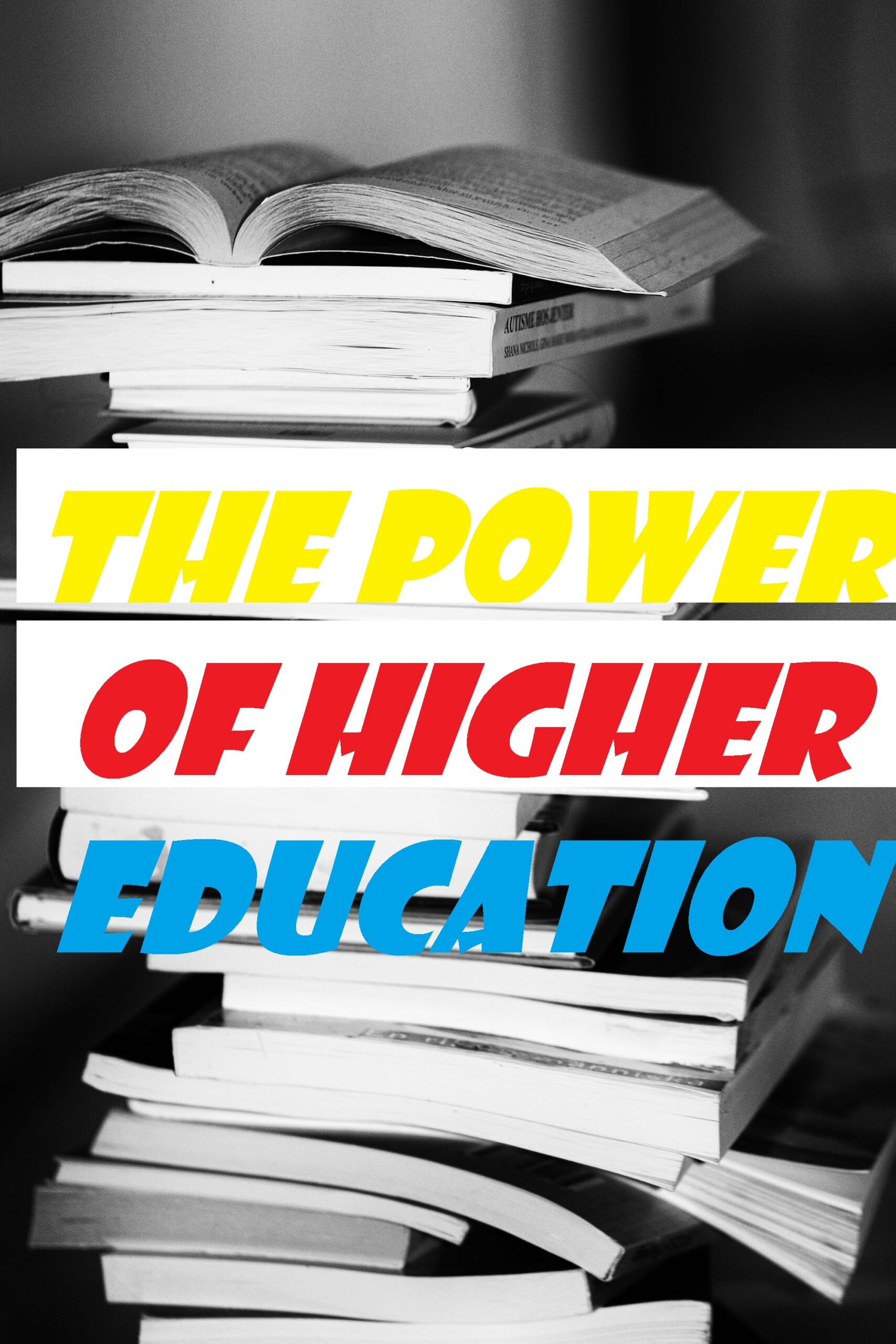“The Power of Higher Education: Elevate Your Future”
***freeDIGIBOOK***“The Joyful Journey: A Guide to Happiness”
Chapter 1: The Transformative Impact of Higher Education
Adjectives: transformative, life-changing, empowering
Adverbs: profoundly, positively, significantly
Verbs: elevate, empower, transform
Higher education has a transformative impact on one’s life, elevating and empowering individuals to achieve their full potential. Pursuing higher education can profoundly and significantly shape one’s future positively.
Higher education is a life-changing experience that can have a profound impact on individuals. Pursuing higher education has the power to transform a person’s life, providing them with the knowledge and skills needed to excel in their chosen field. The empowering nature of higher education can elevate individuals to new heights and help them achieve their personal and professional goals.
The transformative impact of higher education extends beyond the individual to society as a whole. Educated individuals have the ability to contribute to their communities and make a positive impact in the world. Higher education is a powerful tool for social and economic mobility, providing opportunities for individuals to break the cycle of poverty and achieve their dreams.
Moreover, higher education can enhance a person’s critical thinking and problem-solving abilities. This can lead to the development of innovative solutions to some of the world’s most pressing issues, from climate change to social inequality. The transformative power of higher education extends beyond the classroom and into the broader world, making it an essential investment for individuals and society as a whole.
In conclusion, the transformative impact of higher education is life-changing, empowering, and elevating. Pursuing higher education can profoundly and significantly shape one’s future positively, providing opportunities for personal and professional growth. The benefits of higher education extend beyond the individual to society as a whole, making it an essential investment for building a better future.
Chapter 2: The Benefits of a Higher Education
Adjectives: valuable, practical, essential
Adverbs: undoubtedly, consistently, critically
Verbs: equip, prepare, enhance
Undoubtedly, The Power of Higher Education provides valuable benefits that are essential in today’s society. Pursuing higher education equips individuals with practical skills and knowledge necessary to succeed in their careers and prepare for the future. It also enhances personal growth and development.
The benefits of higher education are numerous and essential in today’s society. Pursuing higher education equips individuals with valuable practical skills and knowledge that are necessary to succeed in their careers and prepare for the future. The education that is received during higher education prepares individuals for the real world and helps them gain a deeper understanding of their chosen field.
One of the primary benefits of higher education is the practical knowledge and skills gained in the classroom. Students learn essential technical and critical thinking skills that are vital in their chosen profession. They also gain knowledge about the latest advancements and best practices in their field, which can help them stay up-to-date and remain competitive in the job market.
In addition to technical skills, higher education also enhances personal growth and development. Students learn to communicate effectively, work collaboratively, and think critically. These soft skills are highly valued by employers and are essential in building a successful career.
Furthermore, The Power of Higher Education provides opportunities for networking and building connections. Students are exposed to a diverse range of individuals from different backgrounds and professions, which can lead to valuable connections and career opportunities. This networking can also lead to mentorship and guidance from experienced professionals in the field, providing a valuable source of support and advice.
Finally, The Power of Higher Education also provides a sense of accomplishment and personal fulfillment. Completing a higher education program is a significant achievement that can boost self-confidence and provide a sense of pride. This sense of accomplishment can help individuals overcome challenges and setbacks in their personal and professional lives.
In conclusion, the benefits of higher education are valuable, practical, and essential in today’s society. Pursuing higher education equips individuals with the skills and knowledge necessary to succeed in their careers and prepare for the future. It also enhances personal growth and development and provides opportunities for networking and building connections. The sense of accomplishment and personal fulfillment gained through higher education is also a significant benefit.
Chapter 3: Overcoming Challenges in Pursuing Higher Education
Adjectives: challenging, daunting, intimidating
Adverbs: courageously, persistently, resolutely
Verbs: overcome, persevere, conquer
Pursuing higher education can be a challenging and daunting experience, with numerous obstacles that may seem overwhelming at times. However, with the right mindset and approach, these challenges can be overcome. Courage, persistence, and a resolute mindset are essential in overcoming the obstacles that come with higher education.
One of the biggest challenges of pursuing higher education is managing the workload. College coursework is often more rigorous than high school, and the amount of work required can be overwhelming. However, by developing effective time management and organizational skills, students can learn to prioritize their workload and manage their time effectively.
Another challenge that students face is the financial burden of higher education. Tuition fees, textbooks, and other expenses can add up quickly and become a major source of stress. However, there are many options available for financial aid, such as scholarships, grants, and student loans. By researching and applying for these resources, students can alleviate some of the financial burden of higher education.
Additionally, the social and emotional transition to college life can be challenging for many students. Adjusting to a new environment and making new friends can be daunting, but by courageously stepping outside their comfort zone and seeking out opportunities to connect with others, students can overcome these challenges and build a supportive social network.
Lastly, academic challenges such as exams, essays, and research papers can be intimidating for many students. However, by persistently seeking out academic support resources such as tutoring, study groups, and office hours, students can overcome academic challenges and develop a stronger understanding of their coursework.
In conclusion, The Power of Higher Education pursuing higher education can present numerous challenging obstacles that may seem daunting at first. However, with courage, persistence, and a resolute mindset, anyone can overcome these challenges and achieve their educational goals. Effective time management and organization skills, financial aid resources, building a supportive social network, and seeking academic support can all help students successfully navigate the challenges of higher education.
Chapter 4: The Role of Mentorship in Higher Education
Adjectives: supportive, influential, guiding
Adverbs: actively, compassionately, wholeheartedly
Verbs: mentor, guide, support
Mentorship plays a vital role in higher education, providing supportive and influential guidance for students. Active, compassionate, and wholehearted mentorship can guide and support students in their pursuit of higher education and beyond.
A mentor is someone who provides guidance, support, and advice to a mentee. In higher education, mentors can be professors, alumni, or professionals in the industry. They have the experience and knowledge to provide valuable insights and advice to students as they navigate their academic and professional journey.
One of the key benefits of mentorship in higher education is the support and guidance that mentors can provide to their mentees. Mentors can provide students with the tools and resources they need to succeed, such as study strategies, career advice, and networking opportunities. They can also offer emotional support and encouragement, helping students navigate the challenges of higher education with confidence and resilience.
Mentorship can also have a significant impact on a student’s career trajectory. A mentor can provide industry insights and connections, opening doors to career opportunities and helping students build valuable professional networks. They can also offer guidance on career paths, helping students make informed decisions about their future.
Compassionate mentorship can also have a profound impact on a student’s personal growth and development. A supportive mentor can help a student build self-confidence, develop resilience, and overcome challenges. They can also provide a role model for positive behavior and values, such as empathy, integrity, and accountability.
In conclusion, mentorship plays a vital role in higher education, providing supportive and influential guidance for students. Active, compassionate, and wholehearted mentorship can guide and support students in their pursuit of higher education and beyond. By providing guidance, support, and advice, mentors can help students navigate the challenges of higher education, build valuable professional networks, and achieve their academic and career goals.
Chapter 5: The Importance of Networking in Higher Education
Adjectives: valuable, strategic, collaborative
Adverbs: intentionally, proactively, strategically
Verbs: connect, collaborate, expand
Networking is a valuable and strategic tool in higher education, facilitating collaborative opportunities and connections. Intentionally, proactively, and strategically expanding one’s network can lead to various opportunities and professional growth.
Networking is an essential aspect of higher education that can have a significant impact on a student’s academic and professional success. By intentionally, proactively, and strategically expanding one’s network, students can connect with industry professionals, collaborate with peers, and explore various opportunities for personal and professional growth.
Networking in higher education involves building and maintaining relationships with individuals in one’s field of interest. This includes professors, alumni, industry professionals, and peers. These connections can provide valuable insights, advice, and guidance on academic and career-related matters.
Networking can also facilitate collaborative opportunities, allowing students to work with peers and professionals to develop innovative solutions to real-world problems. Collaborative projects can help students build essential skills such as communication, teamwork, and problem-solving, which are highly valued by employers.
Expanding one’s network strategically can also lead to various opportunities for personal and professional growth. Networking events such as career fairs, conferences, and alumni events provide opportunities to connect with industry professionals and explore various career paths. By attending these events and building relationships with professionals, students can gain valuable insights into their industry of interest and learn about new opportunities for growth and development.
Additionally, networking can help students build a supportive community of peers and mentors who can provide emotional support, encouragement, and guidance throughout their academic and professional journey. This sense of community can be instrumental in helping students navigate the challenges of higher education and build a fulfilling and successful career.
In conclusion, networking is a valuable and strategic tool in higher education that can facilitate collaborative opportunities and connections. Intentionally, proactively, and strategically expanding one’s network can lead to various opportunities and professional growth. By building and maintaining relationships with individuals in one’s field of interest, students can gain valuable insights, advice, and guidance, explore various career paths, and build a supportive community of peers and mentors.
Chapter 6: Balancing Work and Higher Education
Adjectives: demanding, challenging, time-consuming
Adverbs: effectively, efficiently, creatively
Verbs: manage, prioritize, balance
Balancing work and higher education can be demanding, challenging, and time-consuming. However, with effective, efficient, and creative management, prioritization, and balance, individuals can successfully pursue higher education while maintaining their careers.
Balancing work and higher education can be a challenging and demanding experience that requires careful planning, effective time management, and prioritization. Pursuing higher education while maintaining a job can be time-consuming and stressful, but with efficient and creative management, individuals can successfully balance both commitments.
One of the key strategies for balancing work and higher education is effective time management. Students need to schedule their time wisely to ensure that they have enough time for both work and school. They can use tools such as calendars, to-do lists, and time-tracking apps to keep track of their schedule and make the most of their time.
Prioritization is another essential aspect of balancing work and higher education. Students need to prioritize their workload to ensure that they are focusing on the most critical tasks first. This involves identifying the most important assignments and deadlines and allocating their time accordingly.
Additionally, creative management can be instrumental in balancing work and higher education. This involves finding ways to integrate work and school tasks, such as completing coursework during lunch breaks or on the weekends. Students can also explore flexible work arrangements such as telecommuting or flexible schedules to help manage their workload.
Finally, seeking support from family, friends, and colleagues can also be helpful in balancing work and higher education. Asking for help with tasks such as childcare or household chores can help to reduce stress and free up time for coursework.
In conclusion, balancing work and higher education can be demanding, challenging, and time-consuming. However, with effective, efficient, and creative management, prioritization, and balance, individuals can successfully pursue higher education while maintaining their careers. By using strategies such as effective time management, prioritization, and creative management, and seeking support from family and colleagues, students can successfully navigate the challenges of balancing work and higher education.
Chapter 7: Financial Considerations in Pursuing Higher Education
Adjectives: significant, challenging, practical
Adverbs: responsibly, diligently, realistically
Verbs: budget, save, invest
Pursuing higher education can have significant financial implications, presenting practical but challenging considerations. Responsibly budgeting, diligently saving, and realistically investing in education can lead to a successful and financially sound future.
Pursuing higher education is a significant investment that can have significant financial implications. The cost of tuition, textbooks, and living expenses can add up quickly and become a significant financial burden for students and their families. Therefore, it is essential to consider financial considerations when pursuing higher education.
One of the key financial considerations for pursuing higher education is responsibly budgeting. Students should create a realistic budget that considers their income, expenses, and debt. By developing a budget that takes into account all their financial obligations, students can make informed decisions about their spending and avoid falling into debt.
Diligent saving is also essential in pursuing higher education. Students should aim to save as much as possible before and during their higher education journey. This can include setting aside a portion of their income each month and looking for opportunities to cut expenses.
Investing in higher education is also a practical consideration. Students should research financial aid options such as scholarships, grants, and student loans to help offset the cost of tuition and other expenses. Students can also explore part-time work or internships in their field of interest to gain valuable experience and earn additional income.
Additionally, students should realistically invest in their education by choosing a program that aligns with their career goals and has a high return on investment. This includes researching job prospects, starting salaries, and potential career growth opportunities in their field of study.
In conclusion, financial considerations are an essential aspect of pursuing higher education. Responsibly budgeting, diligently saving, and realistically investing in education can lead to a successful and financially sound future. By developing a realistic budget, exploring financial aid options, and investing in their education strategically, students can successfully navigate the financial challenges of pursuing higher education.
Chapter 8: The Impact of Diversity in Higher Education
Adjectives: inclusive, diverse, enriching
Adverbs: actively, intentionally, genuinely
Verbs: embrace, celebrate, promote
Inclusive and diverse higher education environments create enriching and innovative learning experiences. Actively, intentionally, and genuinely embracing, celebrating, and promoting diversity can foster an inclusive and equitable educational community.
Diversity in higher education has become an essential aspect of creating an inclusive and equitable educational environment. Embracing, celebrating, and promoting diversity can create enriching and innovative learning experiences that benefit all members of the community.
An inclusive and diverse higher education environment provides students with opportunities to learn from individuals with different backgrounds, perspectives, and experiences. This can broaden students’ understanding of different cultures and ways of life, and help them develop empathy and compassion for others. Students can learn from their peers and build relationships that transcend social barriers.
Furthermore, diversity in higher education promotes innovation and creativity. Diverse perspectives can bring unique insights and solutions to the table, leading to more innovative ideas and approaches. It can also help students develop critical thinking skills by challenging their assumptions and biases.
In order to create an inclusive and diverse higher education environment, it is essential to actively, intentionally, and genuinely embrace, celebrate, and promote diversity. This can include initiatives such as recruiting a diverse student body, faculty, and staff, providing cultural competency training, and promoting diversity and inclusion events and activities.
Creating an inclusive and diverse higher education environment also involves addressing systemic issues such as discrimination and bias. This can be achieved by implementing policies and procedures that ensure fairness and equity for all members of the community, and by actively challenging and addressing instances of discrimination or bias.
In conclusion, diversity in higher education is essential for creating an inclusive and equitable educational environment. Embracing, celebrating, and promoting diversity can create enriching and innovative learning experiences that benefit all members of the community. Actively, intentionally, and genuinely promoting diversity can foster an inclusive and equitable educational community that embraces differences and values diversity.
Chapter 9: The Societal Impact of Higher Education
Adjectives: progressive, influential, transformative
Adverbs: significantly, positively, meaningfully
Verbs: shape, impact, contribute
Higher education has a progressive and influential impact on society, shaping and contributing to progress in various fields. Pursuing higher education positively and meaningfully impacts both individuals and society as a whole.
Higher education has a transformative impact on individuals, but it also has a significant impact on society as a whole. Higher education has the power to shape and contribute to progress in various fields, from scientific research to social and political movements.
One of the key ways higher education contributes to society is through research and innovation. Universities and colleges are often at the forefront of scientific research, developing new technologies and advancing our understanding of the world. This research can have a significant impact on society, from improving healthcare to addressing climate change.
The Power of Higher Education also contributes to progress in social and political movements. Universities and colleges provide a platform for students to engage in activism and advocacy on issues such as human rights, social justice, and environmental sustainability. Students can bring attention to important issues and mobilize others to take action, leading to meaningful change.
Additionally, The Power of Higher Education plays a significant role in the workforce. Graduates with higher education degrees often have access to higher-paying and more prestigious jobs. They also bring specialized skills and knowledge to the workforce, which can contribute to innovation and progress in various industries.
Higher education also contributes to the development of civic engagement and democracy. Higher education provides opportunities for individuals to develop critical thinking, analytical, and communication skills, which are essential for informed citizenship. Graduates with higher education degrees are often more engaged in their communities and more likely to participate in the democratic process.
In conclusion, The Power of Higher Education has a transformative and influential impact on society, contributing to progress in various fields. Pursuing higher education positively and meaningfully impacts both individuals and society as a whole. Higher education contributes to research and innovation, progress in social and political movements, the workforce, and civic engagement and democracy. Higher education is an essential part of creating a progressive and equitable society.
Chapter 10: The Lifelong Benefits of Higher Education
Adjectives: enduring, far-reaching, lasting
The Power of Higher Education provides enduring, far-reaching, and lasting benefits that continue long after graduation. Pursuing higher education can equip individuals with the knowledge, skills, and resources necessary for a successful and fulfilling life.
One of the most significant benefits of higher education is the continuous learning it provides. Higher education encourages individuals to be persistent and constantly seek knowledge and growth in their personal and professional lives. It instills a lifelong learning mentality that allows individuals to adapt to changing environments and develop new skills throughout their lives.
The Power of Higher Education also prepares individuals for successful careers. A higher education degree is often a prerequisite for many high-paying and prestigious jobs. Graduates with higher education degrees are typically more competitive in the job market and have access to a wider range of career opportunities.
In addition to career advancement, higher education can also lead to personal growth and development. Pursuing higher education provides individuals with a platform for self-discovery, exploration, and reflection. It allows individuals to expand their knowledge, broaden their perspectives, and explore new ideas.
Furthermore, The Power of Higher Education can provide individuals with social and cultural capital. It can facilitate the development of valuable professional networks and provide exposure to diverse perspectives and experiences. Graduates with higher education degrees are often more engaged in their communities and have a better understanding of the world around them.
In conclusion, The Power of Higher Education, provides enduring, far-reaching, and lasting benefits that continue long after graduation. Pursuing higher education equips individuals with the knowledge, skills, and resources necessary for a successful and fulfilling life. It provides continuous learning opportunities, prepares individuals for successful careers, leads to personal growth and development, and provides social and cultural capital. Higher education is an investment that pays dividends for a lifetime.





One thought on “The Power of Higher Education: Elevate Your Future”
Comments are closed.